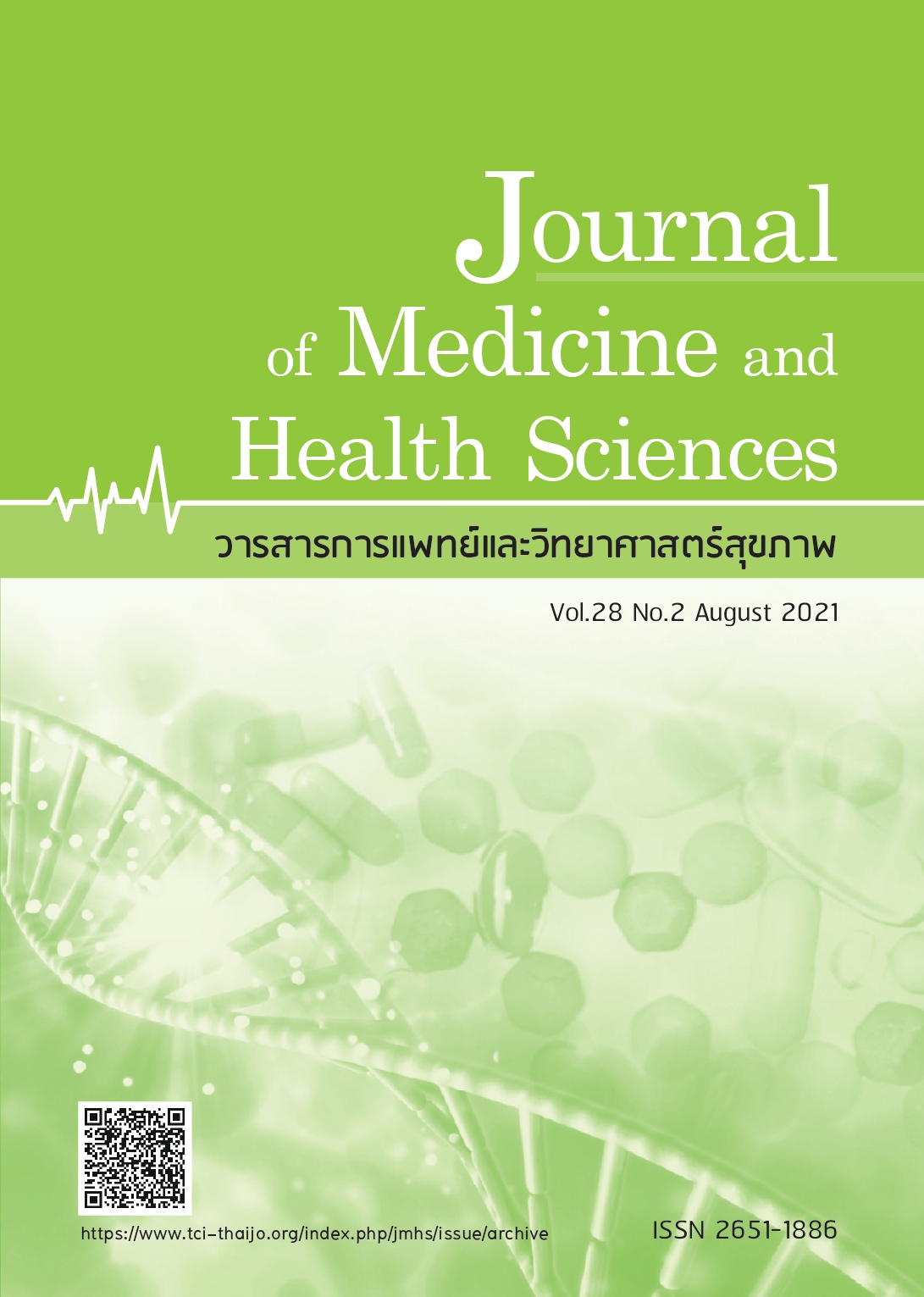The effects of using computer program to assist dietary control of weight reduction among overweight nursing students at Srinakharinwirot University
Keywords:
computer program, dietary control, weight loss, overweight nursing studentsAbstract
This quasi-experimental research aimed to compare the pretest and posttest weights and body mass indices (BMI) of the students before and after using a computer program for helping with the dietary control for overweight nursing students and to compare the pretest and posttest weights between the experimental and control groups of overweight nursing students. The sample was composed of both male and female nursing students at the Ongkharak Campus of Srinakharinwirot University who had a BMI > 23.0 kg/m2. The data were collected for 12 weeks from October 2019 to January 2020. The sample was divided into an experimental group of 32 students and a control group of 31 students. The instruments used in conducting the study were as follows: (1) a calorie counting computer program for weight loss among people with over-nutrition, and used a phone with internet access as the main instrument; (2) a “Calorie Diary” for recording daily food intake for the control group; and (3) a digital scale for weighing the participants in kilograms. The data obtained were analyzed using descriptive statistics and statistical testing of the research hypothesis with a paired t-test and a t-test. The research findings revealed that the comparison between the students in the experimental group, who were enrolled in the computer program for the dietary control of overweight nursing students. This showed that there was no statistical significance between participants of different weights and BMI values in both the pretest and posttest. The results of the comparison between the students in the experimental group and the control group revealed that there were no statistically significant differences in terms of weight and BMI. These results indicated that the perception of self-efficacy in order to control self-diet was not high enough. Although the sample group acknowledged the standard number of calories per day in the experimental group, as well as the control group, who had been recording their daily diets in their diary and could not control themselves. Therefore, both groups perceived that their daily intake of calories were not different. This research suggested that a variety of methods for self-efficacy and dietary control should be applied, or deployed for food exchanges.
References
[cited 2021 April 5]. Available from: http://dental2.anamai.moph.go.th/download/download/.
2. Aekplakorn W, Inthawong R, Kessomboon P, et al. Prevalence and trends of obesity and association with socioeconomic status in Thai adults: National Health Examination Surveys 1991-2009. J Obes 2014;17:8.
3. Aekplakorn W, Porapakkham Y, Taneepanichsku S, et al. editors. Health examination survey office Thailand. Thailand national health and examination survey 2008-2009. Nonthaburi: Health Systems Research Institute (HSRI); 2009. Sponsored by Health Systems Research Institute (HSRI).
4. Wongmusik P, Pumprawai A, Vattanaamorn S. Effects of Weight control program by application of the motivation Theory and Social Support for body mass index, waist
circumference knowledge and weight control behaviors of staffs in fort Wiphavadlrangsit Hospital. JRTAN 2015; 16:33-40.
5. Banerjee P, Mendu VVR, Korrapati D, et al. Calorie counting smart phone apps: Effectiveness in nutritional awareness, lifestyle modification and weight management among young Indian adults. Health Informatics J 2020;26:816-28.
6. Martin CK, Gilmore LA, Apolzan JW, et al. Smartloss: a personalized mobile health intervention for weight management and health promotion. JMIR Mhealth Uhealth
2016;4:e18.
7. Bandura ANYGLP. Social learning theory. 1977.
8. Polit DF, Beck CT. Nursing research: generating and assessing evidence for nursing Practice. 2017.
9. Schapiro N A, Green E K, Kaller S, et al. Impact on Healthy Behaviors of Group Obesity Management Visits in Middle School Health Centers. J Sch Nurs 2021;37:87-98.
10. Patrick W. Physical activity and dietary determinants of weight loss success in the US General population. Am J Public Health 2016;106:321-6.
11. Thamlikitkul S, Sinudompol S. Losing weight of obese nursing students at Kuakarun Faculty of Nursing in Navamindradhiraj University. KJN 2016;23:7-30.
12. Tamteangtrong R, Sangin S, W. D. Factors predicting nutritional health-promotion behaviors among pregnant adolescents. JFONUBUU 2017;25:49-60.
13. Srimongnam V, Peanchana A. The Effects of a dietary program by modification selfefficacy theory the implement to stages of change model and social support theory for nursing students with overweight of Ratchathani University. Ratchaphruek J 2015;13:115-23.
14. Kiatchanog S. The effective of low calarie diet eating behavioral change guideline for a weight reduction program among overweight and obese students. SDU Res J 2015;8:1-22.
15. Maytapattana M. Factors associated with food consumption behavior of nursing students. JFONUBUU 2017;25:20-9.
16. Emily B, Hendrie G A, Freyne J, et al. A Mobile phone app designed to support weight loss maintenance and well-being (MotiMate): Randomized Controlled Trial. JMIR Mhealth Uhealth 2019;21:1.



